
"Stand by Me" is a song originally performed in 1961 by American singer-songwriter Ben E. King and written by him, along with Jerry Leiber and Mike Stoller, who together used the pseudonym Elmo Glick. According to King, the title is derived from, and was inspired by, a spiritual written by Sam Cooke and J. W. Alexander called "Stand by Me Father," recorded by the Soul Stirrers with Johnnie Taylor singing lead.
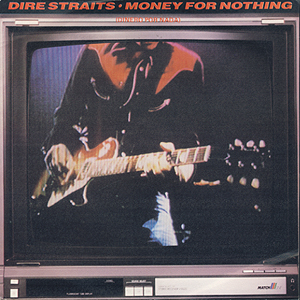
"Money for Nothing" is a song by British rock band Dire Straits, the second track on their fifth studio album, Brothers in Arms (1985). It was released as the album's second single on 28 June 1985 through Vertigo Records. The song's lyrics are written from the point of view of two working-class men watching music videos and commenting on what they see. The song features a guest appearance by Sting who sings the signature falsetto introduction, background vocals and a backing chorus of "I want my MTV". The groundbreaking video was the first to be aired on MTV Europe when the network launched on 1 August 1987.

"Amanda" is a power ballad by American rock band Boston written by Tom Scholz. The song was released as the first single from the band's third album, Third Stage, in 1986, six years after it was recorded.

"You're Only Human (Second Wind)" is a song written and performed by Billy Joel that originally appeared on Greatest Hits – Volume I & Volume II in 1985. The song deals with teenage depression and suicide. It became a top-ten hit, peaking at No. 9 on the Billboard Hot 100.
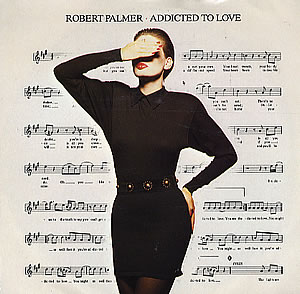
"Addicted to Love" is a song by English rock singer Robert Palmer released in 1986. It is the third song on Palmer's eighth studio album Riptide (1985) and was released as its second single. The single version is a shorter edit of the full-length album version.

"Broken Wings" is a 1985 song recorded by American pop rock band Mr. Mister. It was released in June 1985 as the lead single from their second album Welcome to the Real World. The song peaked at number one on the Billboard Hot 100 in December 1985, where it remained for two weeks. It was released as the band was just about to embark on a US tour opening for Tina Turner. "Broken Wings" became the first of two consecutive number ones of the band on the American charts, the other chart-topper being "Kyrie". Outside of the United States, "Broken Wings" topped the charts in Canada, peaked within the top ten of the charts in Australia, Belgium (Flanders), the Netherlands, Norway, the Republic of Ireland, Switzerland, the United Kingdom and West Germany, and the top twenty of the charts in Austria, New Zealand, Spain and Sweden.

"How Am I Supposed to Live Without You" is a song co-written in 1982 by Doug James and Michael Bolton. The track was originally recorded by Laura Branigan in 1983, charting at number one in both the US and Canada. The ballad has been recorded by many artists around the world, in several languages, most notably by Bolton himself in 1990, becoming something of a modern pop standard. Instrumental versions of the song have been recorded featuring variously the piano, guitar, saxophone, pan flute, steel drum, and music box.

"Say You, Say Me" is a song written and recorded by American singer and songwriter Lionel Richie for the film White Nights. The single hit number one in the US's Billboard Hot 100 and on the same publication's Hot Black Singles chart in December 1985. It also became Richie's ninth number-one on the Billboard Adult Contemporary chart. The track is not available on the film's soundtrack album, as Motown did not want Richie's first single following the massive success of his 1983 album Can't Slow Down to appear on another label. It was included by Motown on Richie's 1986 release Dancing on the Ceiling.
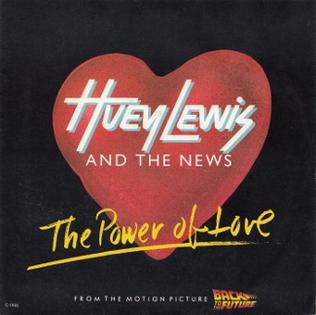
"The Power of Love" is a 1985 single by Huey Lewis and the News, written for the soundtrack of the 1985 blockbuster film Back to the Future. The song became the band's first number-one hit on the U.S. Billboard Hot 100 and their second number-one hit on the U.S. Mainstream Rock chart. In the United Kingdom, it was released as a double-A side with "Do You Believe in Love," becoming the band's only top ten hit on the UK Singles Chart. The song is included alongside "Back in Time" on the film's soundtrack, and appears as a bonus track on international editions of the band's fourth studio album, Fore!. The song also played on an episode of The Really Loud House, "I Wanna Hold Your Hand", at the end.
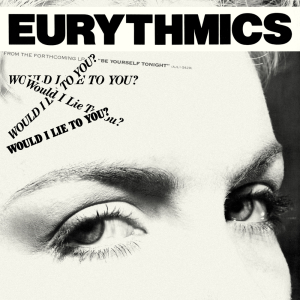
"Would I Lie to You?" is a song written and performed by British pop duo Eurythmics. Released on 9 April 1985 as the lead single from the band's fourth studio album, Be Yourself Tonight (1985), the song was the first by the duo to feature their change in musical direction from a predominantly synthpop style to rock and rhythm and blues. The song, and its accompanying album, featured a full backing band and relied less on electronic programming.

Valotte is the debut studio album by singer-songwriter Julian Lennon. The album was produced by Phil Ramone and recorded at several studios from February to August 1984. It was released in October 1984 on Charisma and Atlantic. The album was first certified gold in the United States, in the new year, then shortly afterwards being certified platinum. From the album, four singles were released, each with a music video, charting at various positions on the singles charts in both the United Kingdom and US. "Too Late for Goodbyes", the second US single, and "Valotte", the first US single, were both US Billboard Top 10 hits, the former reaching No. 5 and the latter reaching No. 9. The album peaked at No. 17 in the US and No. 20 in the UK. Lennon toured the US, Australia, and Japan in March–June 1985.
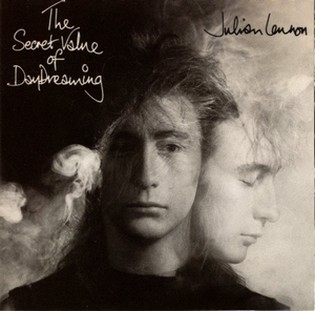
The Secret Value of Daydreaming is the second studio album by singer-songwriter Julian Lennon.

Mr. Jordan is the third studio album by singer-songwriter Julian Lennon. It was Lennon's first album in three years, after taking a hiatus from the music industry.

"Something About You" is a single released by British band Level 42 in 1985, in advance of its inclusion on the album World Machine the same year. The song was written by Mark King, Mike Lindup, Phil Gould, Boon Gould, and Wally Badarou.
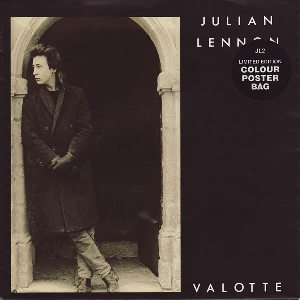
"Valotte" is a song by British singer Julian Lennon, the title track and second single from his debut album Valotte. It was a top-ten single in January 1985 on the US Billboard Hot 100 and Canadian pop charts, peaking at No. 9. On the US Adult Contemporary chart, "Valotte" peaked at No. 4. On the Canadian AC chart, it spent two weeks at No. 2.

"Too Late for Goodbyes" is the first single from Julian Lennon's debut studio album Valotte (1984). It featured the harmonica of Jean "Toots" Thielemans, and it was a top-10 hit, reaching No. 6 in the UK Singles Chart in November 1984, and No. 5 on the Billboard Hot 100 singles chart in late March 1985. B-side "Big Mama" has been described by Lennon as "semi-hard rock".

"Tonight She Comes" is a 1985 song by American rock band the Cars from their Greatest Hits album. It was released as a single in October 1985, reaching number seven on the Billboard Hot 100 in January 1986. The song reached number one on the Top Rock Tracks chart, where it stayed for three weeks.

"Because" is a song recorded by English rock band The Dave Clark Five from their third studio album American Tour (1964). The song was produced by Adrian Clark, the song was originally the B-side to "Can't You See That She's Mine" in the UK.
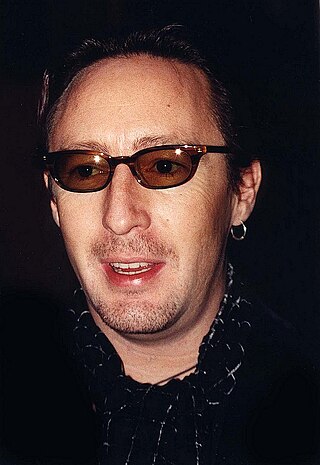
British musician Julian Lennon has issued many recordings since 1984. Some of his singles, such as "Too Late for Goodbyes", have reached the top position in various charts.
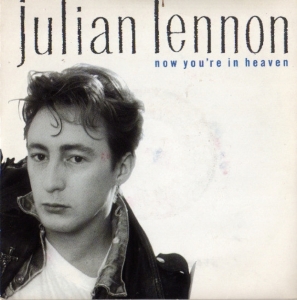
"Now You're in Heaven" is a song written by Julian Lennon and John McCurry, recorded by Lennon and released as the lead single from his third studio album, Mr. Jordan (1989), on which the song appears as the opening track. A David Bowie-inspired song, it was the highest-charting single released from the album, topping the US Billboard Album Rock Tracks chart and reaching No. 5 in Australia. It was certified gold in the latter country by the Australian Recording Industry Association (ARIA) for shipments of over 35,000 units.



















